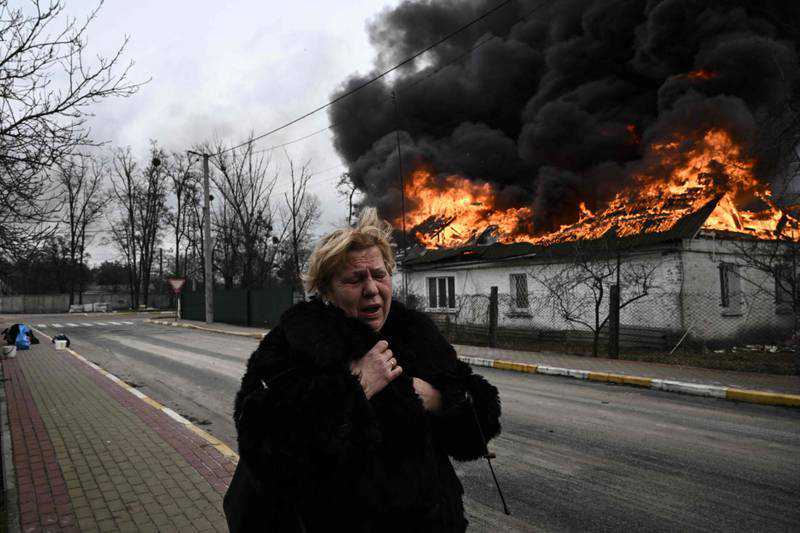Ukraine conflict poses increased risk to global economic outlook, Moody's says

The Ukraine conflict and subsequent economic sanctions on Russia have “increased risks” to the global economic outlook, although the extent of the impact will depend on the length and severity of the crisis, according to Moody's Investors Service.
Commodity price shocks will increase inflationary pressures, particularly in economies that are heavy importers of Russian commodities, the ratings agency said in a report on Friday.
The conflict in Ukraine could reduce the level of global gross domestic product by 1 per cent by 2023, or about $1 trillion, and add up to 3 per cent to global inflation in 2022 and about 2 percentage points in 2023, according to the UK’s National Institute for Economic and Social Research. “Escalation of the military conflict would put Europe's economic recovery at risk,” said Kelvin Dalrymple, vice president and senior credit officer at Moody's. “The rest of the world will be affected by commodity price shocks at a time when inflation is already high, and by financial repercussions from the sanctions against Russia and from financial market volatility.”
The US and EU have imposed various sanctions against Russia in a bid to cripple its economy. However, they have not targeted its energy and commodity industries. “Russia and Belarus will feel the most direct impact of sweeping sanctions imposed by the US and its allies. The sanctions will also have an indirect impact on foreign entities that do business with Russia. All of these developments could have knock-on consequences for the global economy,” Moody's said.
In 2020, Russia produced about 10.2 million barrels a day of crude oil and natural gas condensate, placing it second after the US, with Saudi Arabia in third place, according to the 2021 BP Statistical Review of World Energy. It is also the second-largest producer of natural gas in the world.
Russia is also a major producer of metals including aluminium, platinum, copper and palladium, and their prices have climbed because of the crisis. “While other countries that produce these metals will benefit from higher prices, consumers will face higher costs as the increases are passed on to them,” Moody's said. Russia and Ukraine dominate the global production of neon gas, a component in semiconductor manufacturing, which could further exacerbate chip shortages and supply problems in the auto industry, the agency said.
Global financial markets have been volatile since the conflict began. “Geopolitical uncertainty, higher commodity prices, escalating sanctions and regional business disruptions will weigh on market sentiment,” Moody's said. “If this translates into a significant and extended squeeze on liquidity, it would weaken funding conditions for global high-yield issuers, and for emerging market countries that are reliant on global capital flows, some of which are already experiencing constrained access to financing.”
Military offensives have historically created an equity market low, with US stocks becoming “increasingly volatile” over the last few trading days and making what could be a “near-term bottom”, said Derek Deutsch, managing director and portfolio manager at ClearBridge Investments.
“With inflation risks skewed even more to the upside by conflict-related commodity price spikes, the US Federal Reserve will likely not deviate materially from the market’s pricing of rate hikes. Such inflationary pressures are felt more strongly and directly in Europe and could lead to more dovish policy stance by the European Central Bank,” he added.
Against this backdrop, the euro fell to a seven-year low versus the Swiss franc and hit its lowest point in almost two years versus the dollar on Friday.
The European single currency fell 2.1 per cent this week and was set for its worst week since April 2020. “The Russia-Ukraine crisis has not only heightened geopolitical risk, but it signifies a major shift in the world order to one that is more multipolar,” said Tracy Chen, portfolio manager, fixed income, at Brandywine Global. “The end results are likely to be more frequent and more unpredictable flare-ups and higher market volatility.”
Another area of concern from the conflict is food supply. Russia and Ukraine account for roughly 14 per cent of the world's wheat supply and 25 per cent of global wheat exports.
Wheat and other grain prices have risen sharply, even though the impact on food supply is mitigated since it is currently winter and not the harvest season, Moody's said.
Russia is a leading producer of soybeans, which is increasing in price, while the cost of oil-based fertilisers is also likely to rise. A prolonged conflict is heightening worries about global food inflation and hunger, the UN agency International Fund for Agricultural Development (IFAD) said on Thursday.
“We are very concerned that an extended conflict in Ukraine could limit the world’s supply of staple crops like wheat, corn and sunflower oil, resulting in the skyrocketing of food prices and hunger,” Rome-based IFAD said. “This could jeopardise global food security and heighten geopolitical tensions.”
Previous Story
- Russia's invasion of Ukraine leaves global trade in...
- Apple announces halt to all product sales in...
- Fitch and Moody's downgrade Russia to 'junk' as...
- Crypto will not save Russia from sanctions, experts...
- Russian rouble plunges to record low amid outrage...
- Moody’s places Russia and Ukraine ratings on review...
- Russia-Ukraine conflict raises big risks for global economy
- Grains surge amid supply concerns over Ukraine